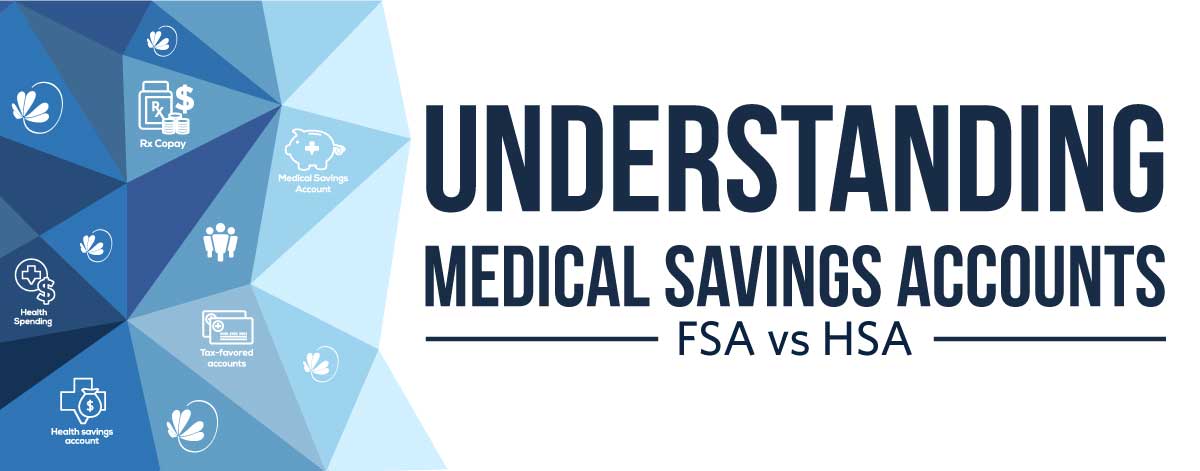Breaking Down Flexible Spending Accounts and Health Savings Accounts
Posted on May 16, 2021
Updated December 2022

There are multiple medical tax-favored savings plans that can make paying for medical expenses more manageable when partnered with health insurance plans. While all these options have great features and benefits, few health and banking professionals take the time to break them down in easy to understand language. The two most common medical savings plans that are often confused with each other are Flexible Spending Accounts (FSAs) and Health Savings Accounts (HSAs).
An individual and their spouse are usually unable to make contributions to both an FSA and HSA. Because of this, it is important to understand the similarities and differences between the two accounts to ensure you are choosing the best option for you and your family’s medical needs.
USE IT OR LOSE IT
A Flexible Spending Account (FSA) is a use-it-or-lose-it option for tucking money away to pay for medical expenses throughout the year. An FSA allows employees to be reimbursed for medical expenses. These accounts are typically funded through voluntary salary reduction agreements with an employer. This means no federal income taxes are deducted from the contribution.
In 2019, the Internal Revenue Service (IRS) determined salary reduction contributions to an FSA cannot exceed $2,700 (although an employer can establish a lower contribution limit). If the FSA is depleted during the year, an individual may not change or revoke their election unless there is a change in employment or family status that is specified by the plan.
To take distributions from an FSA, a debit or credit card is usually issued. In some cases, insurance companies require mailed proof before they will reimburse FSA-eligible expenses made out-of-pocket. Generally, if there are funds left in the account at the end of the year, that money is lost and will not roll over to the following calendar year. Instead unused funds will go back to the employer, who can use the funds towards administering the program.

ROLLOVER YEAR TO YEAR
A Health Savings Account (HSA) works in accordance with a High Deductible (or HSA-qualified) Health Plan. The IRS puts annual contribution limits in place depending on the type of healthcare coverage a person has. Individuals may contribute up to the maximum annual limit and any unused dollars will rollover from year to year. This allows an individual to save up for larger or future medical needs.
With an HSA, eligible individuals may change their contribution elections as many times as they would like throughout the year. In addition to the annual contribution amount, once you reach age 55, you may contribute an additional $1,000 as a catch-up. If you and your spouse are both over 55 and covered by an HSA-qualified plan, you may both be eligible to contribute the $1,000 catch up.*
The rollover feature of the HSAs is causing them to soar in popularity, allowing covered individuals to save up for larger procedures, or even look towards retirement! As you use your HSA, think long-term. Based on the tax benefits and projected medical costs in retirement, it just makes sense to put as much in as you are able and allowed, even if you are a healthy individual with limited medical expenses.
MAXIMIZE TAX BENEFITS
The average medical costs for a couple in retirement as of 2019 may be as much as $285,000 (link is external). Many individuals have decided to start saving up for those expenses early. If a couple in retirement pulls from their retirement plan or IRA to pay those expenses, they may pay income tax on those dollars, not to mention that it may cut into their projected cost of living.
HSA contributions reduce an individual’s taxable income for the year, which is an extremely attractive feature for many Americans. The funds in the account are to be used only for qualified medical expenses (link is external), which can range from doctor appointments and surgeries to contact solution. If funds are used solely for qualified medical expenses, they remain untaxed when leaving the account as well.
If you have an HSA, make sure that you maximize the tax benefits on interest income as well. Per the IRS, you may not pay taxes on interest income earned on your HSA. Pay attention to the annual percentage yield you are earning to ensure you are getting the best return. Currently, Notre Dame FCU is paying 1.25% APY† on our HSA Checking.
WEIGH THE PROS AND CONS
Your healthcare is imperative. We strongly recommend weighing the pros and cons of all options for your healthcare coverage before making any changes or opening new accounts. If you are interested in learning more about HSAs or the products and services we offer, please reach out to us at 574-400-4750 or [email protected] (link sends e-mail).
If you currently have an HSA with Notre Dame FCU, please take a moment to rate us online at https://www.hsasearch.com/hsa_providers/notre-dame-federal-credit-union/(link is external).
*Catch-up contributions must be deposited to each individual’s separate HSA, see Publication 969 or contact your tax-preparer for specific guidance. Consult Publication 969, your benefits administrator or your tax consultant for further guidance on HSAs and FSAs.
†APY is Annual Percentage Yield. Balance must be over $400.00 to earn interest. Visit NotreDameFCU.com/rates for current rates. Insured by NCUA.
Certified Health Savings Professional designation is provided in partnership with Ascensus and the National Association of Federal Credit Unions (NAFCU).

